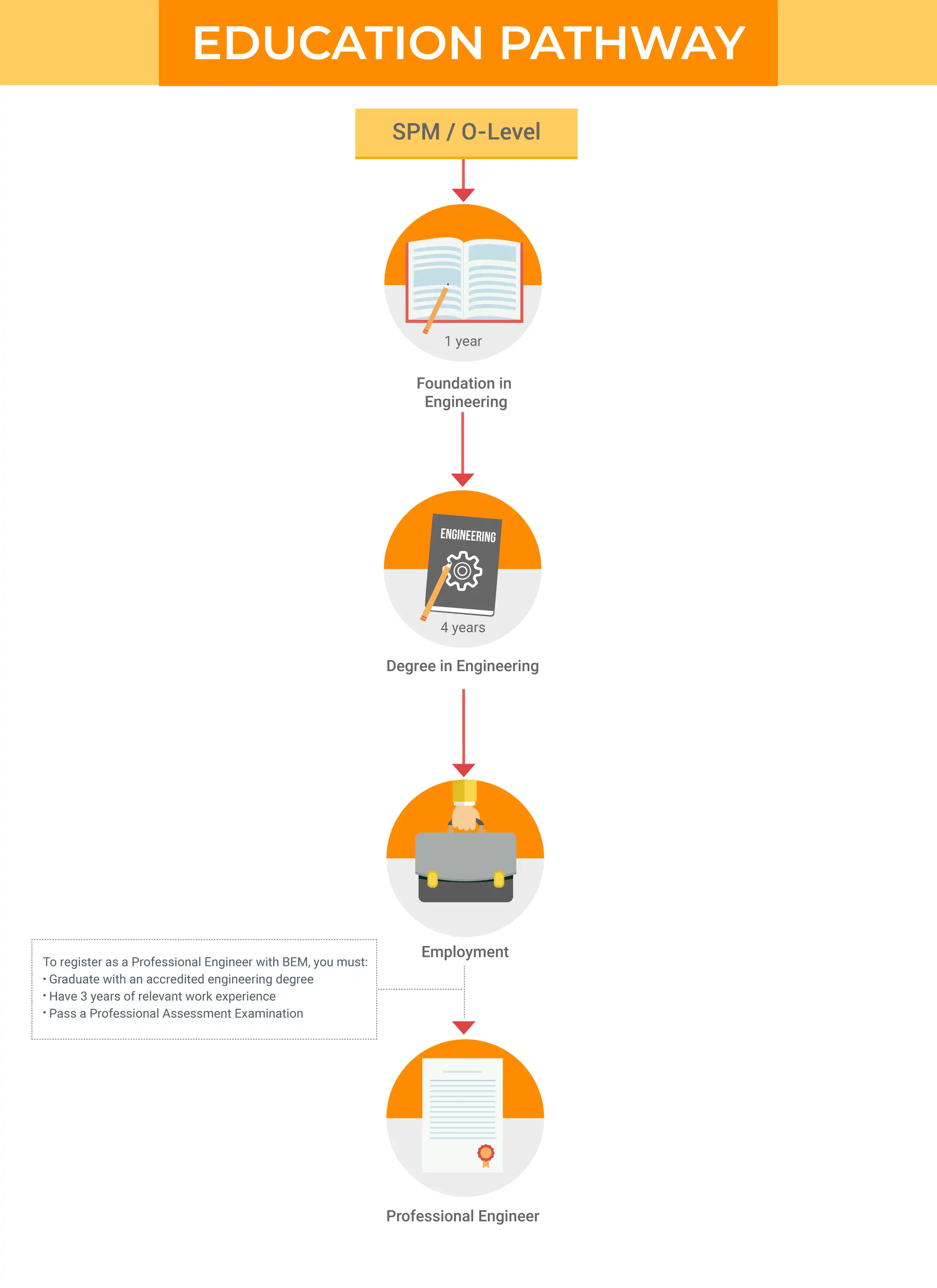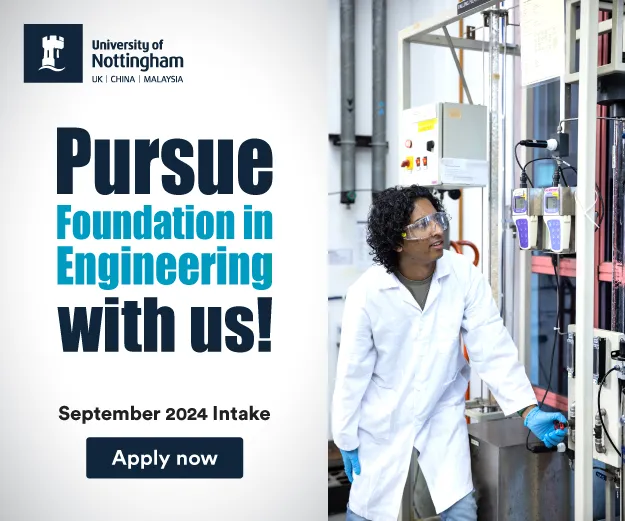The Complete Guide to Studying Foundation in Engineering in Malaysia
What do you study in Foundation in Engineering? Check out entry requirement and subjects, and explore various Engineering pathways with this course guide.

Interested in becoming an engineer? Looking for a quick pathway into an accredited Engineering degree? Well, look no further. What you need is to enrol into a Foundation in Engineering programme.
But what exactly is a Foundation in Engineering and what differentiates it from other pre-university programmes like A Levels, AUSMAT and STPM?
This guide will provide you with the answer to those questions and more. From entry requirements to educational pathways, learn it all from this guide to a Foundation in Engineering programme.
So if you’ve always dreamt of becoming a certified engineer in Malaysia, take your first step with this guide.

University of Nottingham Malaysia
Foundation in Engineering
✓Interact with the best lecturers from the Faculty of Engineering, consistently ranked in the top 20 in the UK, The Complete University Guide
#1. What is Foundation in Engineering?
 A Foundation in Engineering programme is a pre-university programme that focuses on subjects related to engineering. It is structured to prepare you for a direct entry into an Engineering or Engineering-related degree.
A Foundation in Engineering programme is a pre-university programme that focuses on subjects related to engineering. It is structured to prepare you for a direct entry into an Engineering or Engineering-related degree.
Under this programme, you will learn a number of introductory subjects related to engineering and mathematics. This includes calculus, trigonometry, mechanics, chemistry, electricity and magnetism.
Most Foundation in Engineering courses are 12 months long. Seeing as it is a pre-university programme, you can study it directly after SPM. Upon completion, you will be able to easily pursue an Engineering or Engineering-related degree at the same university.

#2. Entry Requirements for Foundation in Engineering
a) Subjects required
To study Foundation in Engineering, you must have studied some of these subjects at SPM or equivalent:
- Mathematics
- Physics
- Additional Mathematics (required by some universities)
b) Requirements for Foundation in Engineering
These are the general entry requirements for a Foundation in Engineering:
- SPM (or equivalent): Minimum 5Cs including Mathematics and Physics

University of Nottingham Malaysia
Foundation in Engineering
✓Interact with the best lecturers from the Faculty of Engineering, consistently ranked in the top 20 in the UK, The Complete University Guide
#3. Studying a Foundation in Engineering Course
a) What subjects will you study in Foundation in Engineering?
A Foundation in Engineering programme will give you a solid understanding of engineering fundamentals, preparing you for further study at the undergraduate level. Your studies will consist of numerous mathematics and science modules that are related to engineering. Among such subjects include:
- Calculus
- Trigonometry
- Engineering mathematics
- Chemistry
- Programming
- Mechanics
- Electricity and magnetism
b) How will you be assessed in a Foundation in Engineering programme?
Most universities will grade you based on a combination of coursework and final exams. As part of your programme, you will spend a significant amount of time performing lab work, working on assignments and attending lectures.
c) How long is a Foundation in Engineering course?
A Foundation in Engineering programme is typically about 12 months long.
d) How much does it cost to study Foundation in Engineering in Malaysia?
A Foundation in Engineering programme costs around RM6,500 to RM30,000.

University of Nottingham Malaysia
Foundation in Engineering
✓Interact with the best lecturers from the Faculty of Engineering, consistently ranked in the top 20 in the UK, The Complete University Guide
#4. Your Education Pathway To Become a Professional Engineer With Foundation in Engineering
Here’s what the road to becoming a professional engineer will look like if you take a Foundation in Engineering programme.

Step 1: First, complete a Foundation in Engineering after SPM. This will typically take 1 year.
Step 2: Subsequently, you can enrol in a Bachelor of Engineering in Malaysia, which usually requires 3 – 4 years of study. If you wish to gain professional status as a professional engineer in Malaysia, you must study an accredited Engineering Degree with a duration of 4 years.
Completing this degree will allow you to enter the workforce.
Step 3: To gain the status of a professional engineer, you must have at least 3 years of practical working experience and pass a Professional Assessment Examination by the Board of Engineers Malaysia.
In summary, it takes 5 years from SPM to become an engineer and 8 years to become a registered professional engineer. This is if you choose the Foundation in Engineering pathway.
#5. Should You Study Foundation in Engineering?
 a) Is Foundation in Engineering right for you?
a) Is Foundation in Engineering right for you?
If you’re wondering whether you should study Foundation in Engineering, here are some questions to think about:
- Are you sure about your decision to pursue a Degree in Engineering and subsequently a career as an engineer?
- Do you have good grades in maths and physics?
- Do you like to experiment with gadgets, machines and electronic devices?
- Are you skilled at practical work?
- Do you consider yourself mechanically inclined?
- Can you think logically and solve complex math problems?
If you answered yes to most of these questions, Foundation in Engineering may be right for you!

b) Skills required to be an engineer
Here are some key skills a good engineer should have:
- Critical thinking skills to solve complex problems
- Active listening skills
- Strong technical skills
- High level of scientific knowledge
- Creative and innovative thinking
- Keen attention to detail
- Organisational and management skills

University of Nottingham Malaysia
Foundation in Engineering
✓Interact with the best lecturers from the Faculty of Engineering, consistently ranked in the top 20 in the UK, The Complete University Guide
#6. Frequently Asked Questions About Foundation in Engineering
a) Can you switch universities after completing a Foundation in Engineering?
Yes, it is possible to switch to another university after completing a Foundation in Engineering, but it will depend on a number of factors.
Unlike A-level or SACEi that have a standardised curriculum, foundation programmes are administered by the universities themselves. This means different universities may offer different subjects and syllabus for the same type of foundation. Therefore, the “receiving” university may need to do an assessment of the foundation programme to ensure that it meets their standards and requirements.
That being said, you can still switch universities after completing your Foundation in Engineering should the “receiving” university accept your qualification. However, it is always recommended to select a college or university that offers both the foundation and your degree of interest. In addition, it’s crucial to select a foundation programme that’s accredited by MQA.
PRO TIP
Some universities have links with various partner universities (locally and abroad) for their Foundation programmes, which gives you more options and allows for easy switching.
b) Can you switch to a non-engineering degree?
This depends on the university and the degree that you want to pursue. Usually, students with a science background can easily switch to non-science and non-engineering degrees such as business, mass communication or hospitality and tourism.
However, if you’re aiming to switch to a professional degree like medicine or pharmacy, you might have to start from the beginning again. If you are switching universities and changing streams, you may be required to take additional subjects or credit hours.
c) What’s the difference between Foundation in Engineering and other foundation programmes?
A Foundation in Engineering is a preparatory programme taken after SPM or IGCSE and is meant to prepare you well for an Engineering degree. As such, the subjects and modules will be heavily related to the engineering field — think engineering mathematics, mechanics, principles of electronics and programming.
General foundation programmes such as Foundation in Science and Foundation in Arts will have a more general focus. For instance, a Foundation in Science may cover a wide range of science subjects while a Foundation in Arts will consist of various business and humanities modules.
d) What’s the difference between Foundation in Engineering and pre-university programmes like A Levels?
The subjects in a Foundation in Engineering programme is often predetermined. You may be able to choose a few electives, but you will be required to take the majority of the modules because the university has determined that these are the subjects that will best prepare you for an Engineering degree.
In contrast, pre-university programmes, such as A Levels and SACEi or AUSMAT, require you to choose a combination of subjects (e.g. physics, chemistry, biology, mathematics) that you think will suit you best. These subjects can be used to gain entry to an undergraduate degree.
#7. Best Universities for Foundation in Engineering in Malaysia
If Foundation in Engineering is for you, then check out some of the best universities for Foundation in Engineering in Malaysia. Alternatively, compare more universities for Foundation in Engineering here.
University of Nottingham Malaysia
Semenyih, Selangor
Intake
Apr, Sep
Tuition Fees
RM29,700
Gain a UK degree from a top Russel Group university in Malaysia
 a) Is Foundation in Engineering right for you?
a) Is Foundation in Engineering right for you?







